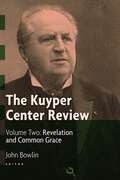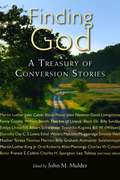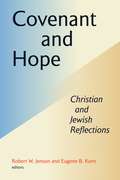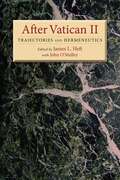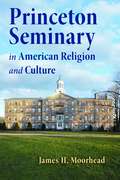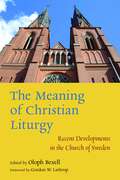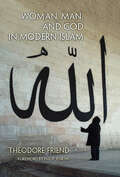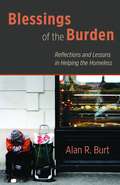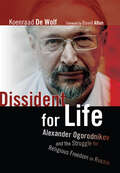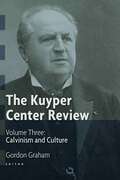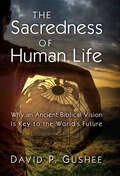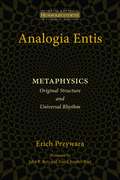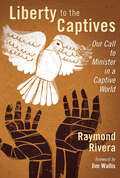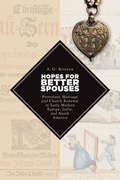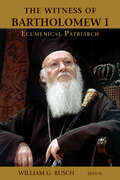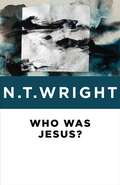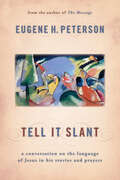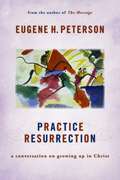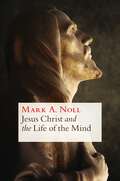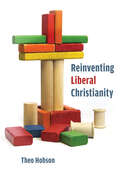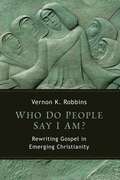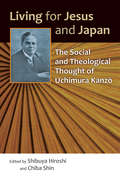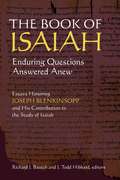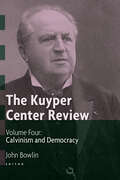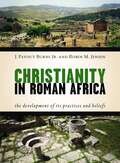- Table View
- List View
The Kuyper Center Review, Volume 2: Revelation and Common Grace
by John BowlinThe Abraham Kuyper Center for Public Theology at Princeton Theological Seminary was established in admiration of Kuyper, whose life as pastor, theologian, journalist, and politician remarkably exemplifies how confidence in the truth of a Christian worldview can be expressed in both theory and practice. The chapters in this book were originally presented at the annual Kuyper Conferences of 2009 and 2010 and are inspired by the themes of those conferences: “Philosophy and Revelation: A Celebration of the Centenary of Herman Bavinck’s 1908-1909 Stone Lectures” (2009) and “Common Grace and ‘A Common Word’” (2010).
Finding God: A Treasury of Conversion Stories
by John M. MulderThe search for God is a staple of human history. Finding God records sixty first-person accounts of Christians who found God in different ways and the impact this discovery made on their lives and on the world in which they lived. Ranging from the first century to the present, Finding God is a fascinating digest of conversion stories from a wide variety of people -- from the apostle Paul to the rock musician Bono. These narratives together demonstrate the remarkable diversity of spiritual journeys and the dramatic changes that can result from encounters with God. Both instructive and inspirational, Finding God will expand horizons and deepen the faith of those who seek insight into the age-old spiritual quest to find God.
Covenant and Hope: Christian and Jewish Reflections
by Robert W. Jenson & Eugene B. KornCovenant and Hope centers around two main themes in Jewish-Christian dialogue: "Covenant, Mission, and Relation to the Other" and "Hope and Responsibility for the Human Future." In the first section scholars from both faiths analyze the idea of covenant, how it determines their religious commitments, behavior, and theology, and how their covenantal theology shapes their relations with people outside their religious communities. The second section focuses on the foundation for religious hope, how belief in the future can be nourished, and on our practical and philosophic responsibility to work for a better human future.
After Vatican II: Trajectories and Hermeneutics
by James L. HeftSince the closing of Vatican II (1962-1965) nearly fifty years ago, several multivolume studies have detailed how the bishops at the council debated successive drafts and finally approved the sixteen documents published as the proceedings of the council. However, opinions vary, sometimes sharply, about the implications of Vatican II. This volume explores the major flashpoints.Contributors:John ConnellyMassimo FaggioliJames L. HeftM. Cathleen KavenyJoseph A. KomonchakJohn O'MalleyFrancis A. SullivanDarlene Fozard WeaverRobin Darling Young
Princeton Seminary in American Religion and Culture
by James H. MoorheadThe story of Princeton Theological Seminary, the Presbyterian Church's first seminary in America, begins in 1812, shortly after the United States had entered into its second war against Great Britain. Princeton went on to become a model of American theological education, setting the standard for subsequent seminaries and other religious higher education institutions.Princeton's story is uniquely intertwined with American religious and cultural history, the history of theological education, the Presbyterian church, and conceptions of ministry in general. Thus, this volume will interest not only those with links to Princeton but also historians of religion, Presbyterians, leaders within seminaries and Christian colleges, and all who are interested in the history of Christian thought in America.
The Meaning of Christian Liturgy: Recent Developments in the Church of Sweden
by Oloph BexellThe Church of Sweden is the largest Lutheran church body in the world, with 6.5 million members that represent about 70% of the Swedish population. The Meaning of Christian Liturgy illuminates and explains the changes that have occurred in the liturgy of the Church of Sweden from 1980 to 2000. In the process, this volume asks a number of questions of immense importance not only within Sweden but also for Christian churches in the English-speaking world, including: How does participation in a liturgy make clear what "church" is about?What does liturgical participation say about who or what God is and about the community's encounter with God?How have churches lived with the changes and renewals introduced in the twentieth century?How does the church building shape worshipers' ideas of God and of church?Contributors:Torbjörn AxnerOloph BexellSven-Erik Brodd, Gordon W. LathropKarin OljelundBoel Hössjer SundmanGunnar Weman
Woman, Man, and God in Modern Islam
by Theodore FriendAward-winning historian Theodore Friend recently set out alone across Asia and the Middle East on a quest to understand firsthand the life situations of women in Indonesia, Pakistan, Saudi Arabia, Iran, and Turkey. Woman, Man, and God in Modern Islam recounts Friend’s remarkable journey and relates hundreds of encounters and conversations with people he met along the way.Commingling a deep respect for Islam and his faith in the potential of women to change their worlds, Friend presents an open, exploratory outsider’s perspective on women in five very different Islamic cultures — timely fare for all who wish to broaden their world horizons.
Blessings of the Burden: Reflections and Lessons in Helping the Homeless
by Alan R. BurtIn Blessings of the Burden Alan R. Burt shares his heart for people who are homeless. Full of personal stories drawn from almost two decades of firsthand experience working with the homeless, this book is a passionate plea for greater community involvement in confronting the pressing social problem of homelessness.Unfolding in five parts, Blessings of the Burden includes Burt's own journey from apathy to advocacy, a moving interview with a formerly homeless man who is now the director of an organization that fights homelessness in Cape Cod, Burt's analysis of the fourteen main reasons why homelessness is such a massive problem in America, and an example of how one community developed an innovative and cost-effective approach to helping the homeless among them. Powerful and compelling, Blessings of the Burden will inspire readers to get involved with the homeless and to become advocates for their needs, believing that they can make a difference in their communities.
Dissident for Life: Alexander Ogorodnikov and the Struggle for Religious Freedom in Russia
by Koenraad De WolfThis gripping book tells the largely unknown story of longtime Russian dissident Alexander Ogorodnikov -- from Communist youth to religious dissident, in the Gulag and back again. Ogorodnikov's courage has touched people from every walk of life, including world leaders such as Bill Clinton, Ronald Reagan, and Margaret Thatcher.In the 1970s Ogorodnikov performed a feat without precedent in the Soviet Union: he organized thousands of Protestant, Orthodox, and Catholic Christians in an underground group called the Christian Seminar. When the KGB gave him the option to leave the Soviet Union rather than face the Gulag, he firmly declined because he wanted to change "his" Russia from the inside out. His willingness to sacrifice himself and be imprisoned meant leaving behind his wife and newborn child.Ogorodnikov spent nine years in the Gulag, barely surviving the horrors he encountered there. Despite KGB harassment and persecution after his release, he refused to compromise his convictions and went on to found the first free school in the Soviet Union, the first soup kitchen, and the first private shelter for orphans, among other accomplishments.Today this man continues to carry on his struggle against government detainments and atrocities, often alone. Readers will be amazed and inspired by Koenraad De Wolf's authoritative account of Ogorodnikov's life and work.
The Kuyper Center Review, Vol 3: Calvinism and Culture
by Gordon GrahamSome religious traditions -- such as Lutheran, Wesleyan, and Eastern Orthodox -- have aesthetically rich resources on which to draw for the renewal of arts in everyday life. In contrast, Calvinism has generally been suspicious of the arts.The essays in this volume attempt to explore new avenues of thought about Calvinism's relation to the arts. Part historical, part theological, and part practical, they offer a wide-ranging exploration of neo-Calvinism's relationship to the arts, both at a general level and in connection with specific art forms. Overall they suggest that the neo-Calvinism espoused by Abraham Kuyper can and should make more of the arts than the traditional view of Reformed Christianity might be thought to allow.Contributors:Clifford B. AndersonJohn BarberJames D. BrattMichael BräutigamJanet DanielsonNeal DeRooJohn De SotoJames EglintonMatthew KaemingkJennifer WangWilliam Baltmanis WhitneyAlbert M. Wolters
The Sacredness of Human Life: Why an Ancient Biblical Vision Is Key to the World's Future
by David P. GusheeThis authoritative book is the most comprehensive examination ever of the sacredness of human life. Never before has one volume explored this subject in such a multifaceted way, encompassing biblical roots, theological elaborations, historical cases, and contemporary ethical perspectives. Tracing the concept of the sacredness of human life from Scripture through church history to the present day, David Gushee argues that viewing human life as sacred is one of the most precious legacies of biblical faith — albeit one that the church has too often failed to uphold. Besides providing a masterful historical survey, Gushee’s discussion covers the many current ethical challenges and perspectives that will impact the survival and flourishing of human life, including biotechnology, the death penalty, abortion, human rights, nuclear weapons, just war theory, women’s rights, and creation care.Gushee’s Sacredness of Human Life is a game-changing book that will set the standard for all future discussions of this key ethical concept.
Analogia Entis: Original Structure and Universal Rhythm (Ressourcement: Retrieval and Renewal in Catholic Thought (RRRCT))
by Erich PrzywaraAlthough Erich Przywara (1889–1972) was one of the preeminent Catholic theologians of his time and a profound influence on such people as Hans Urs von Balthasar and Joseph Ratzinger, he has remained virtually unknown in North America. This volume includes Przywara’s groundbreaking Analogia Entis, originally published in 1932, and his subsequent essays on the concept analogia entis -- the analogy between God and creation -- which has currency in philosophical and theological circles today.
Liberty to the Captives: Our Call to Minister in a Captive World
by Raymond RiveraLiberty to the Captives is a book for any Christians who want to learn how to bring hope and redemption to their communities — for those who are ready to step beyond their comfort zone, leave the status quo behind, and take up Christ's call to minister within a world crying out for the freedom only God can bring. Longtime pastor Raymond Rivera's testimony of a life completely turned around — from gang member to RCA pastor — underscores his powerful message.Full of practical advice about how holistic community-based ministry can bring transformation, healing, and liberation from captivity, Liberty to the Captives encourages Christians to respond to God's call by ministering wherever God has placed them. Based on over forty-five years of pastoring inner-city churches, Rivera's inspiring vision challenges all Christians to think again about how their faith should lead to social action and defense of society's most vulnerable people.
Hopes for Better Spouses: Protestant Marriage and Church Renewal in Early Modern Europe, India, and North America (Emory University Studies in Law and Religion (EUSLR))
by A. G. RoeberModern Protestant debates about spousal relations and the meaning of marriage began in a forgotten international dispute some 300 years ago. The Lutheran-Pietist ideal of marriage as friendship and mutual pursuit of holiness battled with the idea that submission defined spousal roles.Exploiting material culture artifacts, broadsides, hymns, sermons, private correspondence, and legal cases on three continents -- Europe, Asia, and North America -- A. G. Roeber reconstructs the roots and the dimensions of a continued debate that still preoccupies international Protestantism and its Catholic and Orthodox critics and observers in the twenty-first century.
The Witness of Bartholomew I, Ecumenical Patriarch
by William G. RuschIn this volume several theologians from different Christian traditions examine how Bartholomew I as Ecumenical Patriarch has influenced the contemporary European scene, the various dialogues between Orthodox churches and Reformed and Roman Catholic churches, the ongoing work of the World Council of Churches, and the modern ecumenical movement.These essays, largely from non-Orthodox authors, paint a portrait of the Ecumenical Patriarch that has been often overlooked in Western circles -- as a deeply Orthodox leader who wishes to relate Orthodoxy to the modern world and to have it make its contribution to the unity of Christians.Contributors:Anna Marie AagaardPeter C. BouteneffGünther GassmannDale T. IrvinRonald G. Roberson, CSPWilliam G. RuschJoseph D. SmallMary Tanner
Who Was Jesus?: Rediscovering Who Jesus Was And Is (The\ivp Signature Collection)
by N. T. WrightDid the historical person Jesus really regard himself as the Son of God? What did Jesus actually stand for? And what are we to make of the early Christian conviction that Jesus physically rose from the dead?In this book N. T. Wright considers these and many other questions raised by three controversial books about Jesus: Barbara Thiering's Jesus the Man, A. N. Wilson's Jesus: A Life, and John Shelby Spong's Born of a Woman. While Wright agrees with those authors that the real, historical Jesus has many surprises in store for institutional Christianity, he also presents solid reasons for discounting their arguments, claiming that they "fail to reach anything like the right answer" as to who Jesus really was.Written from the standpoint of professional biblical scholarship yet assuming no prior knowledge of the subject, Wright's Who Was Jesus? shows convincingly that much can be gained from a rigorous historical assessment of what the Gospels say about Jesus. This is a book to engage skeptics and believers alike.
Tell It Slant: A Conversation on the Language of Jesus in His Stories and Prayers
by Eugene H. PetersonThe fourth volume in Peterson's best-selling "conversations" in spiritual theologyJust as God used words both to create the world and to give us commandments, we too use words for many different purposes. In fact, we use the same language to talk to each other and to talk to God. Can our everyday speech, then, be just as important as the words and prayers we hear from the pulpit? Eugene Peterson unequivocally says "Yes!"Peterson's Tell It Slant explores how Jesus used language, particularly in his parables and prayers. His was not a direct language of information or instruction but an indirect, oblique language requiring a participating imagination — "slant" language. Tell It Slant beautifully points to Jesus' engaging, relational way of speaking as a model for us today.
Practice Resurrection: A Conversation on Growing Up in Christ
by Eugene H. PetersonWinner of Christianity Today's 2011 award for best book in spiritualityThough bringing people to new birth in Christ through evangelism is essential, says Eugene Peterson, isn't growth in Christ equally essential? Yet the American church by and large does not treat Christian maturity and character formation with much urgency.In Practice Resurrection Peterson brings the voice of Scripture -- especially Paul's letter to the Ephesians -- and the voice of the contemporary Christian congregation together to unpack the crucial truth of what it means to fully grow up to the "stature of Christ."
Jesus Christ and the Life of the Mind
by Mark A. NollNew paperback edition of an acclaimed Christocentric theology for evangelical intellectual lifeAlready an acclaimed Christocentric theology for contemporary evangelical intellectual life, Mark Noll's Jesus Christ and the Life of the Mind (2011) significantly updates Noll’s critical assessment of evangelical Christian scholarship in his landmark Scandal of the Evangelical Mind (1994). In this newer book -- now in paperback -- Noll charts a positive way forward for evangelical thinking and learning.Noll’s Jesus Christ and the Life of the Mind shows how the orthodox Christology confessed in the ancient Christian creeds, far from hindering or discouraging serious scholarship, can supply the motives, guidance, and framework for learning. Christian faith, Noll argues, can richly enhance intellectual engagement in the various academic disciplines -- and he demonstrates how by applying his insights to the fields of history (his own area of expertise), science, and biblical studies in particular.In a substantial postscript Noll candidly addresses the question How fares the “evangelical mind” today? as he highlights “hopeful signs” of intellectual life in a host of evangelical institutions, individuals, and movements.
Reinventing Liberal Christianity
by Theo HobsonIn this provocative book Theo Hobson addresses the current crisis of liberal Christianity. In past years liberal Christianity challenged centuries of authoritarian tradition and had great political influence. It played a major role in the founding of the United States and gave rise to the secular liberalism that we take for granted. But liberal Christianity today is widely dismissed as a watering-down of the faith, and more conservative forms of Christianity are increasingly dominant. Can the liberal Christian tradition recover its influence?Hobson puts forth a bold theory about why liberal Christianity collapsed and how it can be reinvented. He argues that a simple revival is not possible, because liberal Christianity consists of two traditions -- a good tradition that must be salvaged and a bad tradition that must be repudiated. Reinventing Liberal Christianity untangles these two traditions with a fascinating survey of Christian thought from the Reformation to the present and, further, aims to transform liberal Christianity through the rediscovery of faith and ritual.
Who Do People Say I Am?: Rewriting Gospel in Emerging Christianity
by Vernon K. RobbinsSpanning early Christian writings from the Gospel of Mark to the Acts of John, this book by Vernon Robbins explores the various ways early Christians explained their understanding of the special nature of Jesus beyond the canonical Gospels.Who Do People Say I Am? shows how second-and third-century Christian authors of additional Gospels and Gospel-like writings expanded and elaborated on Jesus’ divinity in the context of his earthly existence. According to Robbins, these Christian authors thought that the New Testament Gospel writers could and should have emphasized the divinity of Jesus more than they did.Throughout the book Robbins asks and answers questions such as these:If Jesus introduced new beliefs and practices, what did second- and third-century believers find unresolved in the New Testament Gospels about those beliefs and practices, and how did they try to resolve them?What gaps in the storylines of the New Testament Gospels did second- and third-century Christian writers think could be filled in, and how did they fill them in?If Jesus really were fully divine when he came to earth and lived among his disciples, what experiences did his disciples have that the New Testament Gospels do not tell us?Learning activities and a bibliography at the end of each chapter help make this book a valuable resource for students and any other interested readers.
Living for Jesus and Japan: The Social and Theological Thought of Uchimura Kanzo
by Shibuya Hiroshi & Chiba ShinUchimura Kanzo (1861–1930) was an independent, original, and thought-provoking pioneer of Christianity in modern Japan. His theological values were organically linked with his aspiration for living and practicing such evangelical ideas as prophetic existence, neighborly love, social justice, pacifism, patriotism, and internationalism in the sphere of public life. Uchimura's commitment to the interaction between religious thought and social life is apparent in his well-known epitaph: "I for Japan; Japan for the World; the World for Christ; and All for God."In this interdisciplinary, multi-angled approach to Uchimura Kanzo, the contributors shed light on the inner logic, meanings, and modes of interaction between the religious and social thought observable in Kanzo.Contributors:Andrew E. BarshayKei ChibaShin ChibaKyougae LeeHiroshi MiuraTsunao OhyamaHiroshi ShibuyaTakashi ShogimenYasuhiro TakahashiKunichika Yagyu
The Book of Isaiah: Enduring Questions Answered Anew
by Richard J. Bautch J. Todd HibbardA fresh window on Isaiah studies today Representing the highest echelon of Isaiah studies, this volume explores distinct issues that arise from the critical study of the text of Isaiah. The contributors acknowledge and comment on the exegetical contributions of distinguished biblical scholar Joseph Blenkinsopp, providing distinction and coherence to the collection. The publication between 2000 and 2004 of Blenkinsopp's 3-volume Anchor Bible commentary on Isaiah marked a significant development in Isaiah studies. Many of the articles and books now published in the field cite Blenkinsopp, testifying to how his commentary is influencing and helping shape the future direction of Isaiah studies. This volume, with its focus on his contributions, provides a fresh look at Isaiah studies in the twenty-first century.Contributors: Rainer Albertz Klaus Baltzer Hans M. Barstad Ulrich Berges Willem A. M. Beuken Philip Davies Hyun Chul Paul Kim Peter Marinkovic Andreas Schuele Jacob Stromberg Marvin A. Sweeney Lena-Sofia Tiemeyer Patricia K. Tull H. G. M. Williamson
The Kuyper Center Review, volume 4: Calvinism and Democracy
by John BowlinExplores the influence of Calvinism on democratic theory and practice Abraham Kuyper (1837-1920) -- pastor, theologian, journalist, and politician -- is highly regarded as exemplifying how a Christian worldview can be confidently expressed in both theory and practice. Honoring the spirit of Kuyper's legacy, The Kuyper Center Review annually publishes substantial essays that relate the tradition of Reformed theology to issues of public life. Kuyper was a principal force, both political and intellectual, behind the democratization of politics and public life that occurred in the Netherlands at the close of the nineteenth century. This volume reflects on that legacy, not only examining its theological roots and historical context but also assessing democracy's prospects in our own day and considering the ways in which Reformed theology might provide resources for democratic criticism and renewal.Contributors: Clifford B. Anderson Michael Brautigam Clay Cooke Michael DeMoor James Eglinton George Harinck Brant Himes David Little Jeffrey Stout Harry Van Dyke
Christianity in Roman Africa: The Development of Its Practices and Beliefs
by J. Patout Burns Jr. Robin M. JensenIn-depth, illustrated exploration of how early North African Christians lived out their faith Using a combination of literary and archeological evidence, this in-depth, illustrated book documents the development of Christian practices and doctrine in Roman Africa -- contemporary Libya, Tunisia, Algeria, and Morocco -- from the second century through the Arab conquest in the seventh century. Robin Jensen and Patout Burns, in collaboration with Graeme W. Clarke, Susan T. Stevens, William Tabbernee, and Maureen A. Tilley, skillfully reconstruct the rituals and practices of Christians in the ancient buildings and spaces where those practices were performed. Numerous site drawings and color photographs of the archeological remains illuminate the discussions. This work provides valuable new insights into the church fathers Tertullian, Cyprian, and Augustine. Most significantly, it offers a rich, unprecedented look at early Christian life in Roman Africa, including the development of key rituals and practices such as baptism and eucharist, the election and ordination of leaders, marriage, and burial. In exploring these, Christianity in Roman Africa shows how the early African Christians consistently fought to preserve the holiness of the church amid change and challenge.
